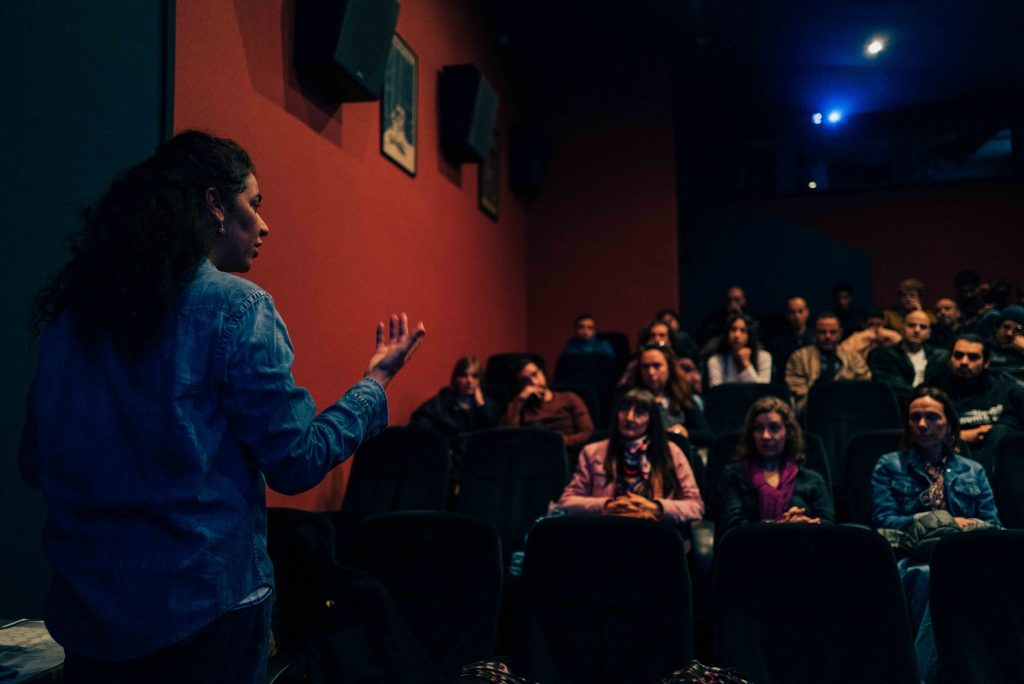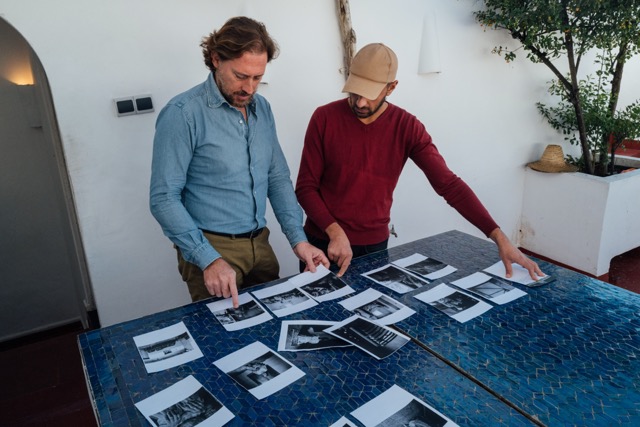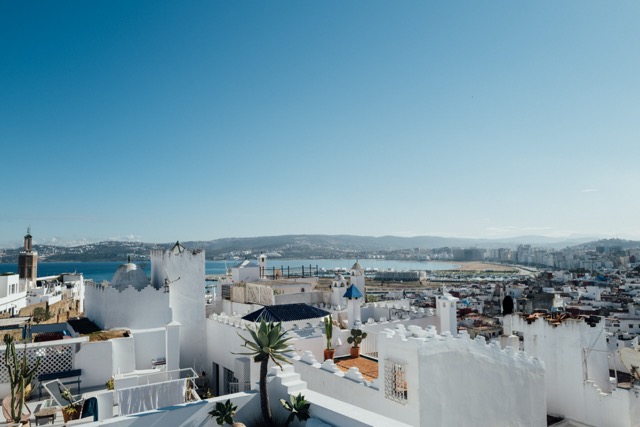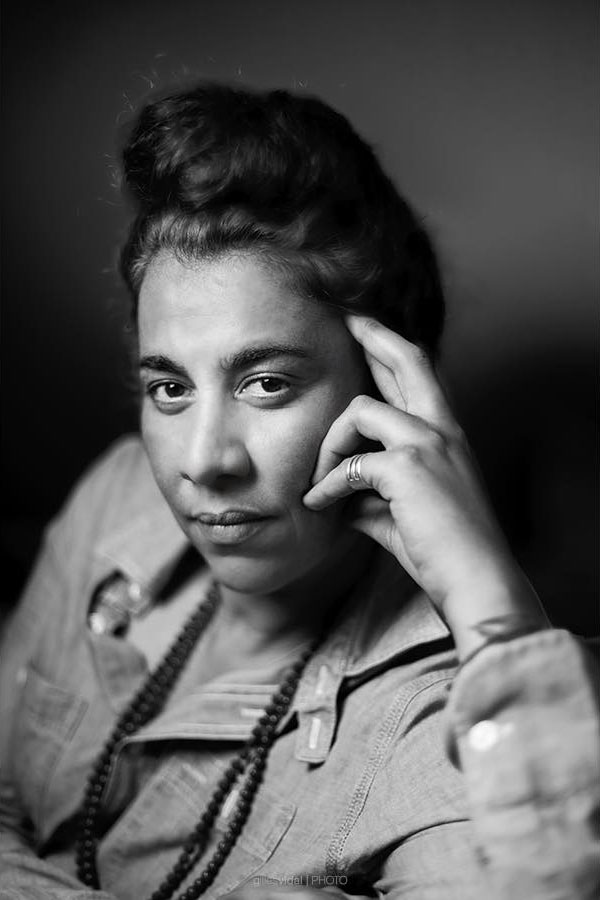YAMNA MOSTEFA
Generazione Critica: What was your educational and professional path?
Yamna Mostefa: I am originally from Carcassonne, in the south of France, and I am 42 years old. My educational background can be considered quite traditional, I hold a baccalaureate in human sciences.
My professional career has been very heterogeneous, but photography has always been a constant in my life.
In 2017, while attempting to resume my studies in psychology, I moved to Sète, a small town in the south of France surrounded by the sea. I spent all my days facing the sea (“face à la mer”).
During that time, I felt an increasing need to narrate, through images, how some Mediterranean south territories had changed, or could change – it had become essential to me. Years before, I had fallen in love with Tangier, with the charm of this cosmopolitan city with a rich artistic heritage. It represented a wonderful idea of the Mediterranean to me. So, I embarked on a journey, with a transdisciplinary project in mind: in 2018, I moved to Tangier to create “Face à la mer” (FALM) together with Wilfrid Estève, the Hans Lucas agency’s director.
GC: Festival dimension is historically the most congenial to promotional and network’s activities in the photographic production field. What are the reasons according to you?
YM: I wouldn’t describe FALM as a festival; we organize professional photography encounters, connecting photographers with international experts, but we don’t hold photo exhibitions. What interests us at FALM are the photographers and how they can professionally emancipate themselves.
Upon our arrival in Moroccan territory, we realized certain shortcomings, gaps in the local photography scene that concerned both training and available tools. We focused on understanding the difficulties photographers encountered in working here and in promoting their work, both within the country and beyond its borders.
GC: In terms of activity and potential audience engagement, how did you set up “Face à la mer”? And through which steps?
YM: FALM’s goal is to trigger discussions, implement initiatives to support projects, and assist independent artists in their career. Our sphere of action targets all professional photographers, whether emerging or established.
We also would like to discover and support unconventional projects, new and daring photographic forms and formats. We created an exchanging space – unfortunately rare in this specific context – among media, publishers, and photographers professionals. We wanted, in short, to do something to professionalize photography in Mediterranean south territories, and that’s how FALM was born.
Initially, it was necessary to bring together local photographers with established experts and professionals, so that they could pursue a career in that direction. There was also a desire to allow them to promote their vision of this region abroad.
The goal was to break the isolation in which local photographers are often immersed. Organizing discussion spaces is always at the heart of our work, photo screenings and public interactions, debates during workshops, portfolio reviews, and roundtable discussions. All of this is for free, with limited places. Every year, we adapt based on feedbacks. We assess what works and what doesn’t and rethink the program to better meet the requirements.

Presentation of the program for 2022 edition to the selected candidates by Yamna Mostefa.
© Photo by Laurent Lecrabe
GC: Who are the artists participating in the meetings?
YM: We have photographers from all over the world – Maghreb, Africa, Italy, Spain, France, Belgium, Canada – who find essential common values in sharing, openness, and exchange. They all come together in Tangier for the photography meetings we organize.
Furthermore, throughout the year, we also carry out activities in other countries, such as France, Italy, and Canada.
GC: How does your work fit into the context of Tangier city and Morocco in general? Have you consolidated relationships with organizations and institutions? Are there exhibition and privileged meeting places?
YM: FALM primarily collaborates with private entities. The exceptions are the French Institute of Morocco in Rabat and the French Institute of Tangier, which are very active in the region.
Among our private partners is the Yzza Slaoui Foundation in Casablanca, Morocco. We are also supported by French companies such as Hans Lucas Pixways and SAIF.
Since 2022, the French Institute of Tangier, in collaboration with the French Consulate in Tangier, has been organizing an exhibition on the consulate’s gates, translated into French and Arabic to reach as many passersby as possible. The exhibition includes a selection of projects by FALM photographers.
GC: Is there a project, among the many realized in the “Recontres” series, to which you look at with particular satisfaction?
YM: There is more than one. For example, our collaboration with the Ragusa Foto Festival, whose artistic director Claudio Composti invited us for portfolio reviews. Claudio is also an important tutor for FALM photographers. Over the years, our exchanges with the Italian photography scene have become increasingly significant.

Tutoring with Claudio Composti (Art director, Italy) and Youcef Senous (Algerian photographer)
© Photo by Laurent Lecrabe
Another important collaboration for us is with Zoom Festival in Canada, where we will present the series “Sincerely Tendrara” by our late Yzza Slaoui. Yzza passed away on November 28, 2021, and this first shared exhibition will be dedicated to her. It will also be the first public presentation of the Yzza Slaoui Foundation (FYS), as well as the first event organized by FALM in Canada.
During that occasion, FYS and FALM will officially present the “Prix International Photo Documentaire Yzza Slaoui”. This award will be open to everyone, without age, gender, or geographical limits, and will focus on documentary photography.
Lastly, we have started a great collaboration with TRANSMISSION, the French training center dedicated to photojournalism. The Grand Prix’s winner will be welcomed into a ten-month professional training course. The course, certified by the Hans Lucas agency, will allow participants to assert their identity and positioning, optimize productions and tools from the shooting phase to the share of final product, understand the economic and legal environment, develop interpersonal skills and networks, broaden horizons, and enrich reflection to renew practice. Additionally, the course includes a three-month internship in a company, providing an opportunity to be integrated into an established and structured reality.
GC: The Mediterranean is a great overlook, symbolically a place of meeting and at the same time of distances. What are the metaphorical and cultural bridges you propose to build?
YM: It is important to develop artistic projects that offer in-depth reflections on lived experiences. Now more than ever, we want to contribute to spreading a future-oriented intercultural Mediterranean identity that celebrates creative energies and supports photographers’ commitment to social change, considering the transformations that involve, isolate, and unite us. These elements bring us back every day to our origins, our present, while considering our future.
It can be noted that the concept of territory and environment recurs with a certain frequency; likewise, certain social issues, which are still challenging to address publicly, are brought to attention through the sensitivity of emerging photographers. Perhaps this is one of the reasons for their work. After all, do photographers truly manage to appropriate a story and tell it through their own eyes?
Subtle approaches are used to address difficult social issues in these territories. For example, Yasmine Hatimi’s work has focused on the issue of masculinity, Yzza Slaoui on the isolation of women caused by climate change, while Abdelhamid Belahmidi has explored digitization and its relationship with society and the individual.
Our societies are facing increasing difficulties in communication, and I believe that photography can be a suitable means to bridge this gap as it is a universal language. Wilfrid Estève and I, being French, live and work between Tangier and France. We think that is important to establish an exchanging channel to continue telling our shared story and learn from each another.
GC: When will start the 2023 edition? Are there any news or previews?
YM: The 2023 edition will take place from November 30th to December 2nd, in Tangier.
This year, we hope to reintegrate a space that we particularly love and that is located in the heart of Kasbah: the Museum of Mediterranean Cultures, which represents an essential heritage site and an important part of the collective Mediterranean memory.

View from the Darnour (FALM’s guest house and partner since 2019)
© Photo by Laurent Lecrabe

